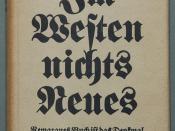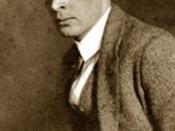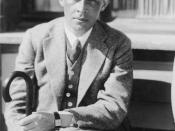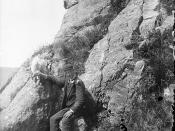All Quiet on the Western Front by Erich Remarque tells about the tragic account of a German teenager, and other millions of young boys killed or mentally shocked and destroyed by World War I, a war that ruined a whole generation. This sad story was written after world war one in 1929 against an environment of war tiredness in a conquered country suffering from inflation and starvation. After living under the Prussian military for nearly half a century, Germans were transformed from poets and painters to inexperienced soldiers. The story gathers around Paul Baumer, the main character. Paul is the performer and hero of the novel who changed from a simple-minded young man to a hardened soldier. He and his classmates had "patriotically"� accept to participate in the war, led and influenced by their teacher, Kantorek. However, they soon found out that war was not that glorious after they faced the "rat-infested"� trenches and the lack of food rations and they realized that they were reduced to passive recipients of torture.
Throughout the novel, Paul mainly focused on trying to stay alive and was constantly worrying whether his friends will survive. In this novel, Remarque also criticized the modern world in Europe and its principles. He criticized the development of technologies that led to the creation of machine guns and all war tools that killed so many people and how the idea of nationalism was interpreted in Germany at that time. He also disapproved the behaviour of rulers and leaders, the division done by the state and how men had been robbed of all individuality and all choice in life.
Before the starting of World War I, Europe was marked by the industrial revolution that results in a technological development in all the fields, especially the development of war engines. Remarque emphasizes the change of military operations from dependence on horses to mechanical devices such as grenades, cannons and flames throwers. Even though they created many work positions and improved many families life, arms, machine guns and artery technologies developments made wars more deadly and killed many people. These new technologies made it "impossible" to break through the enemies lines. The rifle and the machine guns made all frontal attacks suicidal. This created this war that killed over 12000 civilians and militaries. Moreover, Remarque showed that this war caused these young men to become desensitised and to loose all their dreams and objectives in life. When Paul returned home for a few weeks on leave, his books no longer meant anything to him. Paul could no longer deal with being in society. "I find I do not belong here anymore, it is a foreign world"(Remarque 168). Paul's further involvement in war separates him from the life which he cherished so greatly.
In addition to that, Remarque criticized the divisions done by the state inside the society in the modern world in Europe. His critique of modernity included criticism of the levelling effects of socialism. Those divisions were not respected anymore in wartime. In the story, Paul's group was made up of a variety of people. There was a peasant, a farmer, a locksmith, peat digger, and students. In the war these diverse people, who would not normally meet in civilians' life, were struggling to keep their country together. Also near the end of the story, two flamethrowers were getting closer to Baumer and his companion. This latter got up and shoot the flamethrowers and was killed. This act showed how close the "comradeship"� was in the German army and that such a union between different classes of people could improve their lives.
Remarque asked through this novel about what and who caused war. He reflected that some people or "rulers"� in the world could have decided that the war will not happen. No one was right and no one was wrong in this war. Paul and his friends were defending their land and the French and British were doing the same. The enemies are also fathers, husbands, and sons, not big monsters. Remarque pointed out that wars are useful only for leaders who wanted to show their achievements. This idea came from Napoleon in France, who tried to create a cult of personality. Leaders at that time wanted people to follow them for what they did since they were not considered as appointed by god. The only thing that could make people trust the leader and follow him was his achievements. Many leaders in Europe were willing to conquer more lands and win more wars to acquire people's trust. Wars are useful only to those men who never actually see combat. A small number of leaders made the decision to enter a war that cost millions of lives.
Furthermore, Remarque criticizes the European nationalism as it was defined at that time for two main reasons. First, it was this intense nationalism that dominated Europe throughout the 19th and into the 20th century, and the establishment of large armies in Europe (like the so famous Prussian army) that created World War I. Of all the European nations, France was the first to support the idea of nationalism. Many countries became influenced by the French and nationalism spread through out Europe by the nineteenth century. One result that nationalism had on Europe was that they seeking unification. Unified countries such as France, Germany, Russia wanted to extend their empires. This led to many conflicts between countries. All this Conflict eventually resulted in the beginning of World War I. Second, Paul and his friends were pushed to go to the war because of nationalism, or better saying "fake nationalism"�. Remarque illustrated that they died defending nothing because they were too young and too unprepared to defend even their own lives, much less their countries. Those young boys thought that it was an honour to die for one's country. But, nationalism is defined as having a sense of belonging and loyalty to ones country or nation. This does not imply that young boys have to be thrown in the front line of a horrible war to serve their countries! Paul and his friends were very nationalistic, though, since even though the war contradicted their expectations, they still stayed loyal. As a result, the war became the focus of Paul's life. When Paul was still on leave, he felt separated from society. When Paul returns to the trenches from leave, he finds great tranquillity among his companions. "They are more to me than life, these voices, they are more than motherliness and more than fear: they are the strongest, most comforting thing there is anywhere: they are the voices of my comrades" (Remarque.212).
As seen throughout the entire book, the destruction of war was great, on not only lives and property, but also on the human soul and spirit. The young men in this war were subject to physical and moral torture, they really had nothing to gain from it, though. Is it really worth it? Is the simple order of a high officer enough for someone to kill thousands of innocent soldiers? In All Quiet on the Western Front, a group of soldiers learned about the reality of war. They encountered living in trenches, hand-to-hand combat and step-by-step discovered how horrible the war was. Remarque's sympathetic description of the enemy is an attack on the nationalistic values that provoked The Great War. When the enemy becomes human, the patriotism that encouraged the war becomes a monstrous crime. Men were put in opposition against one another under the very same banners.





![[Portrait of Les Paul, Fat Tuesday, New York, N.Y., ca. 1980s] (LOC)](https://s.writework.com/uploads/3/31608/portrait-les-paul-fat-tuesday-new-york-n-y-ca-1980s-loc-thumb.jpg)